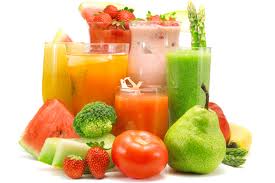What is a Detox and How to Do it
 Adopted by Hollywood stars, featured by spas and promoted by Dr Oz, detox diets have never been hotter. While some may work, others may not only be ineffective but they can also be potentially dangerous. So, before you embark on the latest juice detox, you may want to get your facts straight.
Adopted by Hollywood stars, featured by spas and promoted by Dr Oz, detox diets have never been hotter. While some may work, others may not only be ineffective but they can also be potentially dangerous. So, before you embark on the latest juice detox, you may want to get your facts straight.
Detox diets — The theory behind.
Proponents of detox or ‘detoxification’ diets claim that, for optimal health, it is essential to cleanse the body from toxins that accumulate in the body. By toxins, they are referring to harmful substances that enter the body via smoking, exposure to environmental pollution or pesticides and chemical additives in processed foods. Advocates of detox diets believe that these toxins may get trapped in cells that are functioning poorly or cells of the lungs and gastrointestinal tract — this would result in inflammation, weight gain, lack of energy and an overall decline in health status. That’s where detox diets come in: these diets rely on the premises that, by replacing certain foods by other ‘cleaner’ ones, the body will be able to flush out noxious substances, allowing cells to regenerate. The theory is that these healthier, new cells will improve the body’s efficiency, leading to a rise in metabolism which would facilitate weight loss. Unfortunately (but not surprisingly), there is a lack of scientific research on detox dieting — if big Pharma X is not going to make money out of detox diets, why invest in the research?
The no-no types of Detox diets
Have you heard about the ‘lemonade diet’? Followers of this diet consume only lemon juice, maple syrup, water and cayenne pepper for at least 10 days. One famous artist may have lost 20 pounds on this diet but she regained that lost weight soon after! You see, starvation detox diets like this one is a recipe for failure: severely restricting calories does cause weight loss but that’s mostly water and muscle mass. In other words, they mess up your metabolism!
Other detox diets recommend the use of laxatives or enemas: steer clear of these as they can be dangerously dehydrating and can lead to electrolyte imbalances that can affect your organs especially your heart.
Tempted to follow a detox diet?
Do it safely then.
Consider detox diets as a way of eating ‘clean’ foods — that is, substitute processed foods by more natural ones; foods your grandma would recognize and which are free of artificial ingredients. Go for lean meats, lots of veggies and fruits and make sure to drink loads of water: this kind of diet will keep hunger pangs and sugar cravings at bay and will also help prevent constipation that would cause toxins to accumulate. Moreover, by enjoying a varied but clean diet, you are properly nourishing your liver, whose natural role is to rid the body of toxins.
Here are a few extra pointers:
- Don’t just drink fluids, eat real food too.
- Eat consistently throughout the day e.g. every 5 hours.
- Be active physically.
- Don’t go below 1200kcal per day.
- Include lots of green leafy veggies, lemons, beets, garlic, flaxseed, turmeric, artichokes, apples, berries and other fruits in your detox diet — these contain lots of fiber, vitamins, minerals and antioxidants that will enhance cell repair and will boost your nutrient stores.
Caution: Avoid detox diets if you’re pregnant or breastfeeding, below 18 years old or if you have a compromised immune system.

 Not Sure What Healthy Foods To Eat?
Not Sure What Healthy Foods To Eat? This week we take a look at one of my favorite healthy foods...the mighty Avocado.
This week we take a look at one of my favorite healthy foods...the mighty Avocado.
Comments are closed.